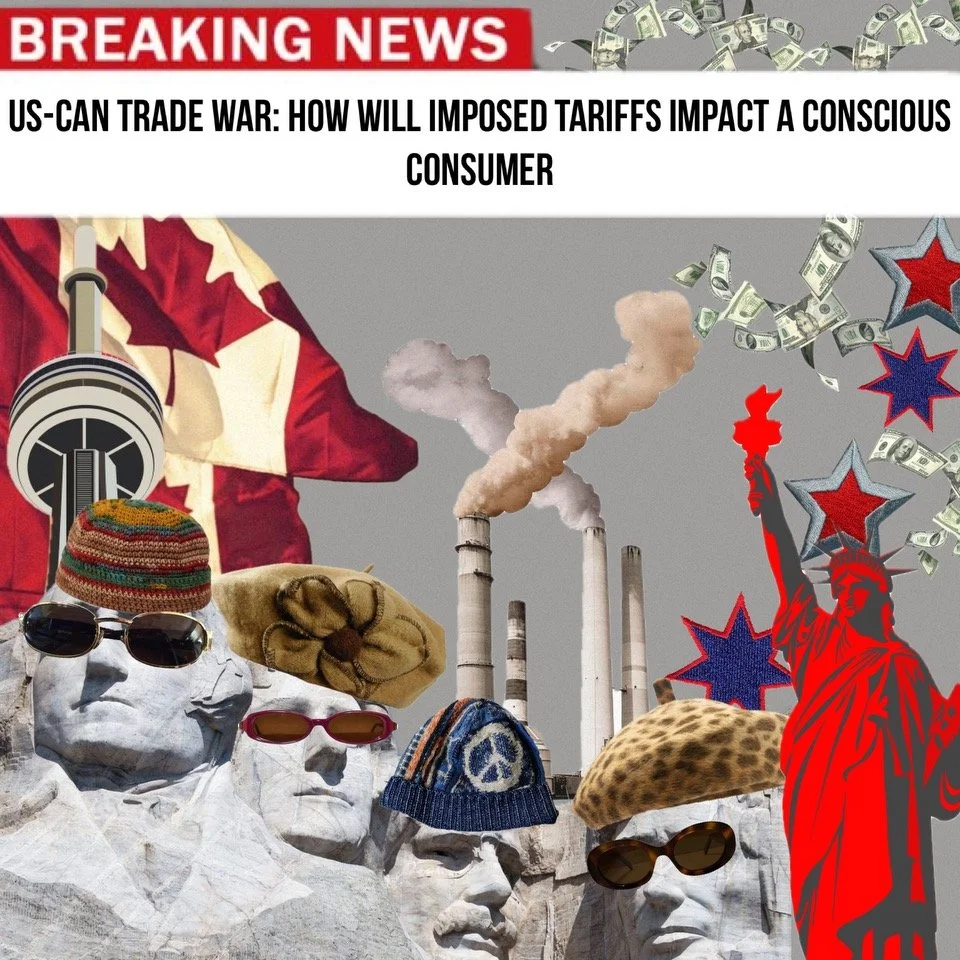How Will Imposed Tariffs Impact a Conscious Consumer
Written by Rory Gould
Media headlines in recent days have highlighted the changing political landscape, with major elections in 2024 and the ever-prominent upcoming Canadian federal election. Threats of trade wars between countries and various tariff stances, what do these policy changes mean for the consumer, and how will they affect the previous push for sustainability?
Escalating Trade Tension
The recently re-elected president of the United States, Donald Trump, has made waves with his promise of 25% tariffs on Canadian goods, including apparel. As of February 1, the white house press secretary announced that the United States planned to move forward with 25% tariffs. This caused the Canadian Minister of Foreign Affairs Mélanie Joly to set retaliatory tariffs of 25% on $155 billion worth of goods, notably all US-made clothing and accessories, in response to the US threats. This caused Trump and the Canadian Government to negotiate a 30-day delay.
While the goods you purchase have not been affected yet, prices throughout the country are set to go up. While it's hard to say yet what will happen, Canada and China have been in communication to reach a new trade agreement that promotes less restricted trade between the two countries. This could make fast fashion prices even more tempting and accessible. Brands such as Shein will become more expensive for the American consumer but less expensive for the Canadian consumer if agreements are made.
Tarrifs Vs. Sustainable Fashion Brands
Many prominent sustainable and slow fashion brands are designed and made in the US and will be affected by these tariffs, which will increase prices for Canadian consumers. Brands such as Reformation, Patagonia, 10Tree, etc., are manufactured in the US. So, while your groceries may increase in price, your favourite sweater may as well. Slow fashion and sustainably made clothing currently have a notoriety for being expensive; these tariffs will not help affordability.
The newly elected Trump administration has made clear they will no longer support the similar push from the Biden administration on promoting sustainability and climate action, which in turn allows companies to decide their stance and efforts relating to ESG. With fewer governmental regulations, it will be important to note how companies adapt to this change and if they continue to uphold sustainable efforts regardless of requirements.
Takeaway!
The best way to get through these changes is to not be tempted by products with appealing pricing that may not be sustainably made, continue to do your research, and be a conscious consumer. Now is the time to support locals! Now may be the time to consider if the products you buy are a necessity or want. While online shopping is convenient, walk to your favourite thrift or consignment store and find locally made Canadian clothing to help our economy and your pocket! Some of DSEF’s favourite Canadian online sustainable stores are Kotn, Wildflower Studio, and Wuxly Movement. Stores to check out in the Halifax Regional Municipality are The Loot, Elsies Consignment, and Venture Thrift.
References
Canada, D. of F. (2025, February 21). Canada announces $155B tariff package in response to unjustified U.S. tariffs. Canada. https://www.canada.ca/en/department-finance/news/2025/02/canada-announces-155b-tariff-package-in-response-to-unjustified-us-tariffs.html
Deppen, L., & Ewen, L. (2024, November 6). 5 ways the election will impact fashion. Fashion Dive. https://www.fashiondive.com/news/5-ways-2024-election-impact-fashion/732150/
Hardy, A. (2024, April 24). Everything you need to know about fast fashion. Vogue. https://www.vogue.com/article/what-is-fast-fashion
O’Neil, S. K., & Huesa, J. (2025, February 5). What Trump’s trade war would mean, in nine charts. Council on Foreign Relations. https://www.cfr.org/article/what-trumps-trade-war-would-mean-nine-charts

